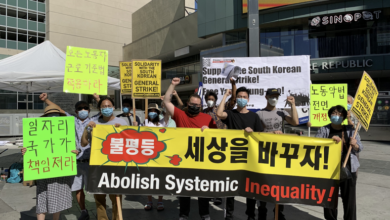During World War II, approximately 200,000 “comfort women,” acting as gifts from the Japanese emperor, were coerced into being sex slaves for the imperialist Japanese army. The Japanese colonial forces abducted women mainly from Korea but also from China, Thailand, Vietnam, Malaysia, Philippines and Indonesia.
 Surviving Korean ‘comfort women’ demonstrate for redress |
The term “comfort women” is not only euphemistic but misleading. The women were not prostitutes and fared far worse. Japanese soldiers serially raped the abducted women in these frontline brothels.
The existence of these brothels became a recruiting tool for the Japanese army. Women were used to lure potential soldiers and made it look as though the government cared about the “comfort” and well-being of the recruits. It helped to foster national loyalty and pride, but it was at the expense of women. It was a worthwhile expense in the eyes of Japanese imperialists if it meant that the soldiers would be more willing to fight and die in a war that only benefited the ruling class.
The surviving “comfort women” deserve compensation and have been fighting for it. But the Japanese government would like to pretend that all of this never happened. It was not until 1993 that Chief Cabinet Secretary Yohei Kono acknowledged the use of force and trickery to lead women into sex slavery and formally apologized. Despite this gesture, there still has not been any state compensation for the survivors.
Feb. 13 marks the 18th anniversary of the redress movement for sex slavery and the 900th weekly demonstration in front of the Japanese embassy in Korea. These women continue to fight for what is rightfully theirs even though the Japanese government has refused to recognize their weekly demonstrations.
Sex slavery and prostitution continue under U.S. occupation
When the U.S. military replaced Japan as the occupying force of Korea, small villages called “camptowns” developed around the main U.S. bases, which continue to this day. These camptowns depend entirely on the U.S. military economy to survive. More than 11 percent of the total population of Gyeonggi Province, for example, is involved with military prostitution.
Prostitution is illegal but is actively regulated by the Korean government, since it is seen as aiding economic development and national security by courting the U.S. military and maintaining good relations with U.S. imperialism.
Sex trafficking is common under imperialist occupations. When Korea was under Japanese colonial rule, the Kyungsung Consulate Order No. 3 legalized prostitution in 1904. One aspect of imperialism is the extraction of valuable resources and labor from oppressed countries and the expansion of markets to sell commodities for a profit. Multi-national corporations super-exploit workers in countries under imperialist domination, driving down the value of labor power within these countries. Because of this, military bases imposed upon oppressed countries by imperialists provide, often times, the only economic opportunities for impoverished workers.
These are economic and social forces driving prostitution and the sex trade in oppressed countries, and they can only be eradicated by putting an end to imperialism. The Japanese government should pay all due reparations to the “comfort women” and the United States and every other imperialist country should abandon all foreign military bases.





